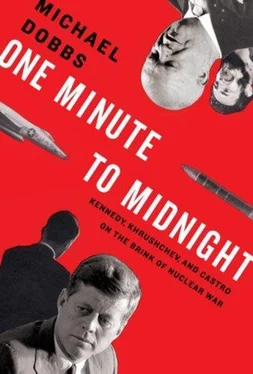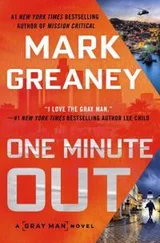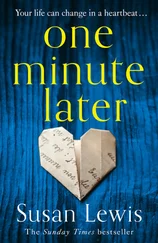“What news?”
Franqui read the news bulletin over the phone and braced himself for an explosion.
“Son of a bitch! Bastard! Asshole!” Fidel went on in this vein for some time, “beating even his own record for curses.” To vent his anger, he kicked a wall and smashed a mirror. The idea that the Russians had made a deal with the Americans “without even bothering to inform us” cut him to the core. He felt deeply “humiliated.” He instructed President Dorticos to call the Soviet ambassador to find out what had happened.
Alekseev had been up late the night before. He was still in bed when the telephone rang.
“The radio says that the Soviet government has decided to withdraw the missiles.”
The ambassador had no idea what Dorticos was talking about. There was obviously some mistake.
“You shouldn’t believe American radio.”
“It wasn’t American radio. It was Radio Moscow.”
11:10 A.M. SUNDAY, OCTOBER 28
The report reaching the North American Air Defense Command in Colorado Springs was startling. An air defense radar had picked up evidence of an unexplained missile launch from the Gulf of Mexico. The trajectory suggested that the target was somewhere in the Tampa Bay area of Florida.
By the time the duty officers at NORAD had figured out where the missile was headed, it was already too late to take any action. They received the first report of the incident at 11:08 a.m., six minutes after the missile was meant to land. A check with the Bomb Alarm System, a nationwide network of nuclear detonation devices placed on telephone polls in cities and military bases, revealed that Tampa was still intact. The Strategic Air Command knew nothing about the reported launch.
It took a few nerve-wracking minutes to establish what had really happened. The discovery of Soviet missiles on Cuba had resulted in a crash program to reorient the American air defense system from north to south. A radar station at Moorestown just off the New Jersey Turnpike had been reconfigured to pick up missile launches from Cuba. But the giant golfballlike installation was still experiencing teething problems. Technicians had fed a test tape into the system at the very moment that an artificial satellite appeared on the horizon, causing radar operators to confuse the satellite with an incoming missile.
A false alarm.
The ExComm began meeting at 11:10 a.m., after JFK returned from church, just as NORAD was clearing up the confusion about the phantom missile attack on Tampa. Aides who had expressed doubts about Kennedy’s handling of the crisis a few hours earlier now vied with each other to praise him. Bundy coined a new expression to describe the divisions among the president’s advisers that had erupted in dramatic fashion on Saturday afternoon.
“Everyone knows who were the hawks and who were the doves,” said the self-appointed spokesman for the hawks. “Today was the day of the doves.”
To many of the men who had spent the last thirteen days in the Cabinet Room, agonizing over the threat posed by Soviet missiles, it suddenly seemed as if the president was a miracleworker. One aide suggested he intervene in a border war between China and India that had been overshadowed by the superpower confrontation. Kennedy brushed the suggestion aside.
“I don’t think either of them, or anybody else, wants me to solve that crisis.”
“But, Mr. President, today you’re ten feet tall.”
JFK laughed. “That will last about a week.”
Kennedy drafted a letter to Khrushchev welcoming his “statesmanlike decision” to withdraw the missiles. He instructed Pierre Salinger to tell the television networks not to play the story up as “a victory for us.” He was worried that the mercurial Soviet leader “will be so humiliated and angered that he will change his mind.”
Exercising restraint proved difficult for the networks. That evening, CBS News broadcast a special report on the crisis “brought to you by the makers of Geritol, a high potency vitamin, iron-rich tonic that makes you feel stronger.” Seated in front of a map of Cuba, correspondent Charles Collingwood tried to put the latest developments in perspective. “This is the day we have every reason to believe the world came out from under the most terrible threat of nuclear holocaust since World War II,” he told viewers. He described Khrushchev’s letter to Kennedy as a “humiliating defeat for Soviet policy.”
Bobby Kennedy had missed the early part of the ExComm meeting because of a hastily arranged meeting with the Soviet ambassador. Dobrynin officially conveyed Khrushchev’s decision to withdraw the missiles from Cuba and passed on his “best wishes” to the president. The president’s brother made no attempt to conceal his relief. “At last, I am going to see the kids,” he told the ambassador. “Why, I’ve almost forgotten my way home.” It was the first time in many days that Dobrynin had seen RFK smile.
On instructions from Moscow, Dobrynin later attempted to formalize the understanding on removing the American missile bases in Turkey with an exchange of letters between Khrushchev and Kennedy. But Bobby refused to accept the Soviet letter, telling Dobrynin that the president would keep his word but would not engage in correspondence on the subject. He confided that he himself might run for president one day—and his chances could be damaged if word leaked out about a secret deal with Moscow. Despite the determination of the Kennedy brothers to avoid creating a paper trail, dismantling of the Jupiters would begin as promised, five months later, on April 1, 1963.
AFTERNOON SUNDAY, OCTOBER 28
Khrushchev’s letter to Castro explaining the reasons for his decision to withdraw the missiles reached the Soviet Embassy in Havana several hours after the Radio Moscow broadcast. When Alekseev tried to deliver the letter, he was informed that Fidel had left town and was “unavailable.” In fact, Castro had no desire to meet with the Soviet ambassador. He was furious with Khrushchev for “abandoning” Cuba at the climactic moment of its showdown with America.
Fidel did pay a brief visit to Soviet military headquarters in El Chico in an attempt to get more information. General Pliyev confirmed that he had received an order from Moscow to dismantle the missiles.
“All of them?”
“All.”
“Very well,” Castro replied, struggling to contain his anger. He stood up. “Fine. I’m leaving now.”
To demonstrate his disapproval of the Soviet decision, Fidel drew up a list of five Cuban “demands” as a precondition for any settlement with the United States. They included an end to the economic blockade, a halt to “all subversive activities,” and a U.S. withdrawal from the Guantanamo Naval Base. He also made clear that Cuba would not accept any international “inspections” of its territory.
As news spread of the Soviet climbdown, Cubans poured into the streets to vent their anger. Once ubiquitous posters proclaiming “Cuba is not alone” disappeared from walls. There were shouts of “Russians go home” and “ Jrucho’ maricon” (“Khrushchev is a queer”). Soon the crowds had invented a new chant:
Nikita, Nikita,
Lo que se da no se quita.
Nikita, Nikita,
What you give, you can’t take away.
Russian soldiers in Cuba were as confused as their Cuban hosts. Many went out and got drunk. A CIA agent in Pinar del Rio described numerous cases of Soviet soldiers selling “watches, boots, and even eyeglasses to raise cash for liquor.” Many were happy to be finally going home, but others broke down and cried, according to a dispatch from the Czech ambassador to Havana. “Some experts and technicians refused to work further and there were many cases of drunkenness in old Havana.”
Читать дальше












